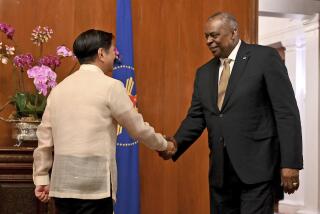Best Route to Keeping Bases Is American Nourishment of Philippine Democracy
- Share via
American and Philippine diplomats sat down last week to talk about the future of Clark Air Base and the Subic Bay Naval Base, two installations often described by defense experts as “irreplaceable” and “vital” to the U.S. strategic position in the Pacific. On the table in Manila, however, are more fundamental U.S. interests--and hovering overhead are storm clouds of Philippine nationalism and anti-nuclear sentiment.
Clark and Subic are indisputably important, but Washington would do well to recognize that the surest way to “lose” the bases is to tell Filipinos that the United States cares more about runways, harbors and gunnery ranges than Philippine democracy and the struggle to create an equitable, prosperous society.
The review of the current Military Bases Agreement will determine compensation to President Corazon Aquino’s government during 1989-91, the last three years of the agreement. In 1983 the United States agreed to pay Ferdinand Marcos $900 million in military and economic assistance for use of Clark and Subic until 1988.
When Aquino ousted Marcos, the Reagan Administration concluded that her government was the last best hope for economic stability and political reform, both urgently needed to blunt a growing communist insurgency. Aware of the bases’ reputed “irreplaceability,” Manila is thinking big bucks for the final three years--perhaps $1 billion per year.
In the light of America’s own budget crunch, such figures are fanciful. But the tab for 1989-91 will surely be higher than the current $180 million per year. It could reach $500 million ($1.5 billion for three years), including all forms of assistance. This would be in line with what the United States pays Greece, Turkey and Spain. But that all depends, of course, on Congress honoring the Administration’s “best efforts” pledge, an uncertain prospect.
Beyond aid, the fundamental questions of sovereignty and nuclear weapons will have to be settled during either the April review or full-scale renegotiation some time before Sept. 15, 1991. On that date the base leases become year-to-year. At stake is whether U.S. forces will have access to Clark and Subic beyond the mid-1990s.
The 1986 Philippine constitution states that foreign military facilities may exist on Philippine soil only if sanctioned by a treaty passed by its Senate and, if both houses so stipulate, approved by national referendum. Even if Aquino and the United States come to an agreement, it is by no means sure the Philippine legislature will concur or submit the issue to the people.
The constitution also contains anti-nuclear principles, but their application is ambiguous. There is substantial anti-nuclear feeling in the Philippines, partly because Clark and Subic might attract nuclear strikes in a war, partly because of generalized nuclear apprehension among lesser powers in the Pacific. Several bills before the Philippine Congress would, if adopted, limit the American military presence by refusing to accept the “neither confirm nor deny” policy on the presence of nuclear weapons under which U.S. forces operate all over the world. In that case the United States would have to drop its policy or leave the bases.
The Soviets are making their views heard. Deputy Foreign Minister Igor Rogachev, opportunely visiting Manila 10 days before the talks began, called Clark and Subic “an anomaly--a remnant of the Cold War.”
Viewed in a larger context, what counts for the United States is survival of Philippine democracy. A government reflecting the genuine wishes of the Filipino people is likely to be stable and secure against the insurgency, one with which America can work harmoniously. Such a government would necessarily reflect the intense nationalism sweeping the Philippines today, making base negotiations all the more contentious.
So be it. America’s long-term interests are served by a strong Philippines, confident of its national identity. The negotiations present not a choice of either democracy or the bases (which is how Marcos put the case implicitly) but an opportunity to begin a more mature relationship between sovereign equals. The U.S.-Philippine relationship is changing, and American policy must reflect sensitivity to an era in which the majority of Filipinos have been born since independence in 1946.
Filipinos are demanding a rationale for the American connection far broader than the simple fact that U.S. bases have been in their country since 1899. Washington must demonstrate that, beyond their strategic utility to the United States, Clark and Subic contribute significantly to the Philippines’ economy and security. The review and renegotiation of the Military Bases Agreement are good places to begin the process of education--for both countries.
More to Read
Sign up for Essential California
The most important California stories and recommendations in your inbox every morning.
You may occasionally receive promotional content from the Los Angeles Times.










